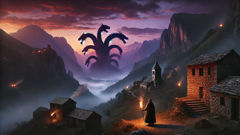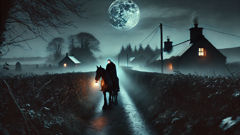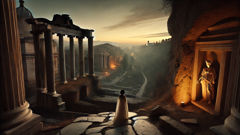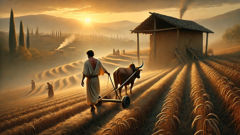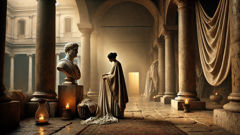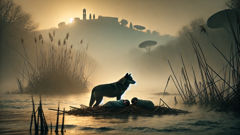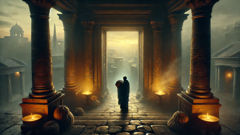Introduction
High in the spine of the Balkans, where ridges cut the horizon into teeth and forests gather their own weather, there lay a kingdom that knew the taste of both bread and sorrow. Villages clung to river terraces like barnacles to a ship; old stones held runes worn almost smooth by a thousand winters. In that land, the people told careful stories to keep fear in its place—tales of wise women, of rivers that remembered names, of bargains with spirits who lived under moss and rock. Yet when the wind came down from the highest peaks carrying a smell of iron and smoke, the villagers understood that ancient things had stirred. It began with the flocks. One night the shepherds found the pastures trampled as though a dozen beasts had stormed through; the tracks led to cliffs and vanished. Then the riverbank bore scorch marks as if lightning had struck without sky. The elders said the mountain had swallowed an old wrong and would not be satisfied. The king refused to believe in monsters. He held councils and raised taxes for troops. He had a fair daughter, a bright princess who braided her hair with the wildflowers of the valley and listened to the people before she listened to the court. She would walk the markets, unseen almost, learning who had bread and who had none. That was when the dragon came—twelve heads like a crown of storms, each with eyes that remembered seasons humans did not. They say the beast demanded tribute in gold and grain, in song and in silence; more terrible, it demanded a living voice to keep its many heads from tearing the valley apart. When the princess was taken from the edge of the market on a dusk of plum-colored clouds, the kingdom's heart stopped. Soldiers sharpened spears and priests burned incense for protection, but the dragon's lair lay where law was thin: inside the mountain's throat, beneath a lake no one dared map. It was there that a young man named Luka, who had once been a plowboy and later a smith's apprentice, would find his measure. He was not born to ruling lineage, nor did he thirst for glory. He knew the language of iron and of earth; he knew the songs of a mother's lullaby and the hush of a field after rain. When the village sent for volunteers, his neighbors said he was steady, and his heart had space for what was hard. The choice he made was not born of destiny alone but of a small, stubborn refusal to let fear keep him silent. So he set out with only a worn cloak, a hammer tempered by his own hands, and a memory of the princess's laugh. His path through the darkened forests and past slate rivers would teach him more than combat: it would teach him how to listen to the mountain's old stories, how to bargain when a creature remembers injustice, and how courage sometimes asks for an impossible price. This is the story of that road, the forging of a man into a kind of hero the valley might recognize when it needed him most.
Of Roots and Rumors: The Making of a Quest
The valley that cradled Luka's childhood had been shaped by more than weather and war; it had been carved by memory. Older folk spoke of times when kings came down from the hills and left marks in stone that still pulsed with meaning when the moon was full. They told of a dispute centuries prior between a mountain spirit and a band of men who had tunneled too greedily for ore, stripping the mountain's ancient veins. Some believed the mountain swallowed the leaders in reprisal; others said the mountain only took a piece of each thief's heart and hid it where roots would not find it. These stories, half history and half warning, grew like lichen across the villagers' lives, and they conditioned how people thought about debt: debts were not just owed to other people but to earth and to pact and to unnamed watchers. When the dragon first darkened the sky, the elders in Luka's village recalled the old quarrel. The beast, they said, might be a consequence that had taken a monstrous shape. But what most explained the dragon's appetite was a simpler, harder thing: hunger bred by a century of broken bargains. The dragon's twelve heads were likened to the many ways humans had taken without asking—many mouths for one wrong. Rumors traveled faster than the couriers the king could spare. Some claimed the dragon had the voices of those it had swallowed; others insisted it could speak and that its words were old law. Luka, who had worked with his hands and watched his neighbors' unspoken fatigue, felt these rumors as a pressure in his chest. He could not accept the princess's loss as if it were a fact of nature.
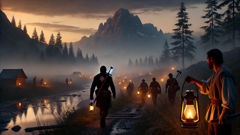
At first he did what any sensible young man does when faced with an impossible thing: he prepared. He apprenticed himself to the smith, learning heat and steel until the hammer in his hand felt like a second heartbeat. The village smith, Marko, was more philosopher than artisan, and he taught Luka not only how to anneal and fold metal but how to shape a blade to a singer's breath—how a weapon must sing and remember the hand that made it. Marko spoke of tempering not as a mere technique but as a moral act: steel hardened in care bears the memory of restraint. Luka learned to listen to the metal when it cooled, to know when it would yield or when it would break, and in that listening he practiced patience. Meanwhile, the princess's absence turned markets quiet, prayers more frequent, and the king's proclamations more brittle. Soldiers patrolled with torches and banners, but their training was for human foes, not for the labyrinthine lairs of mountain beasts. Some merchants offered Luka a purse to go on a fool's errand; others spat curses for daring to hope. More quietly, an old woman named Danica—once a healer who had been banished for speaking with river spirits—told Luka what the courtiers could not: that the dragon had a lineage of grievances. She gave him a small amulet of river-stone wrapped in braided black wool and taught him ways of naming things in the old language, words that mothers had sung to keep infants from slipping into dark water. These names did not command; they reminded. They reopened channels of exchange that men had sealed with arrogance. On the day the village held a council beneath the ancient oak, voices rose and fell like flint against flint. The king's men said to wait and gather greater forces. A merchant captain proposed ransom in silver. A band of mercenaries promised to use bolt and bar to drag the dragon into submission. But the oak, witness to generations, received Luka's answer in silence. He stood and offered himself, not because he fancied battle but because he thought of the princess's curiosity when she had once shared a loaf with peasant children, not because he desired the king's reward. Those who knew him saw that his courage was not a burst but a slow burn. He would need more than strength; he would need allies who understood the mountain's language and the recipes of old bargains. The road to the dragon's lair required not only a blade but stories that could be used like keys.
Thus Luka's journey began in a modest way: a small pack, a hammer, the river-stone amulet, and the whispered songs Danica taught him. He sought out people whose knowledge was overlooked by courts—an ornery forester who could read the tracks of birds, a carpenter who had once dug foundations into caves, a tinkerer who made mirrors for the rich to spy their own faces. From a traveling minstrel Luka learned an ancient ballad that named the mountain's old paths. The minstrel had a half-page of a map scribbled on vellum, faded and patched with wax. They set out at dusk, for the mountain's shadows could hide them, and they kept to narrow paths. Along the way Luka saw the effects of the dragon's rule: fields burned in strange concentric patterns as though twelve tongues had licked them; wells poured up water salted by a bitterness that stank of iron; children had begun to dream of heads in the smoke. But Luka also saw small resistances: farmers burying baked loaves for the foxes so the mice would not starve, a woman dropping seeds in the path for birds, men and women brightening windows with woven garlands to remind themselves they still made beauty. These seemingly ordinary acts became Luka's hidden supply lines for hope. The closer they drew to the mountain's throat, the more the air tasted of old fires and the less their lanterns burned. Nights became exercises in listening. Sometimes the party heard a voice from the dark that mirrored them—a taunt, a memory, a lost lullaby—and Luka learned to reply with the names Danica taught him. The names did not scare the voices away, but they made listening an exchange rather than a dominance. It was in these small exchanges—an answered name, a given coin to a river spirit, a paused insult turned into a shared bread—that Luka practiced the most vital skill: humility before forces older than kings. That humility would be a kind of armor he would wear into the dragon's court.
As they reached the lake that hid the mountain's mouth, the land itself seemed to steady its breath. The water's surface was like black glass; reeds trembled though there was no wind. In the starlight, Luka saw reflections that were not his own and realized the dragon's presence altered not only bodies but perceptions. The minstrel hummed the ballad backward, sounding the steps of old travelers, and the tinkerer produced a small mirror that, when angled just so, allowed them to see around a bend. The mountain's scent carried old salt and the grit of mines long closed. Luka felt something like an answering heartbeat beneath his boots, and for the first time the scale of the challenge registered: twelve heads meant twelve wills, twelve memories, many grievances, and a complex hunger that would not be solved by a single blow. He steadied himself with the smith's mantra: temper early, hammer true. He thought of the princess he had never known well and yet felt the inexplicable familiarity of her laughter. He thought of the villagers who had called him steady. He thought of Marko's lesson: a blade that remembers restraint will cut away only what must fall. The lake's silence pressed close, and the mountain's shadow held its breath, waiting to see what men would bring against a storm made flesh. Luka lifted the river-stone amulet to his chest and stepped forward into a darkness that promised both ruin and revelation.
Twelve Voices: The Mountain's Court and the Final Reckoning
When Luka and his companions found the dragon's mouth, it was not a single cavern but a gallery of arches carved into the ancient rock, each rimmed with crystal veins like frozen lightning. The air was warm and metallic, and from the crevices came a low, rhythmic resonance, as if many drums played beneath the mountain. At first they saw only shapes: coils the color of riverbeds, glances like polished coal, a smear of scales catching the lantern light. Then the heads turned, not in unison but in a slow and careful choreography, as if considering which of them would taste curiosity first. Each head had a different scar pattern and a peculiar eye—some cloudy with age, some sharp and green as a fresh winter leaf. A voice like wind over stone asked them their names in a language that had the cadence of old law. Luka answered the names Danica had taught him, allowing the mountain's old grammar to settle like a rug between them. The dragon's many mouths did not roar immediately. It seemed more interested in cataloguing the people's faces and the small offerings they bore. There was gold among the offerings, but more of it were small things: a child's wooden toy, a scrap of embroidery, a silver bell. The smallest head sniffed and curled at the gift of a loaf wrapped in grape leaves; another head inclined toward the tinker's mirror and studied its own multiple reflections. When the princess was brought forward, she did not scream. Instead she walked with a steady curiosity, her eyes moving like a listener's. Those who had expected a spectacle saw something stranger: the princess and the beast began to share a conversation of glances. Luka felt both dread and a strange, stubborn hope. The dragon's court was less a scene of brute hunger and more a complicated assembly of grievances. One head—older, larger, with a nest of white scars—spoke in a voice like raw river stones. It told a story of miners who had bored to the heart of the mountain and taken from veins that belonged to the earth's slow memory; it recounted songs stolen from the winds and bargains broken when men promised tribute and kept none. The smaller heads chimed in with grievances that sounded like fragments of human lives: a girl whose lullaby had been taken by a lord, a well poisoned by greed, promises unkept that had multiplied like rot. The princess, listening, began to name what could be named—the names of villages, the dates of cruel winters, the names of people who had taken and never returned what belonged to the land. Her voice, which had been raised in market bargaining and charity, now spoke in the language of restitution. In that exchange something frail and human began to be rebuilt: a ledger of wrongs and a tentative list of remedies. Luka realized then that victory might not be a single, clean end. Instead, it would be an uneasy negotiation with a monstrous history.
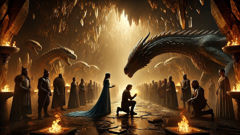
The first battle they fought was with fire and distraction. While the soldiers and mercenaries outside hurled spears and arrows—mostly wasted against scales that glinted like layered shields—Luka and his company sought to open conversation. The minstrel sang a song the dragon's heads knew and remembered; it softened some of the dragon's movement, making certain necks tilt, certain scales relax. The tinker's mirror flashed sunlight back into a head that had been clouded with centuries of dust, and that head paused as if in recognition. Yet not all the heads welcomed talk. Some bared fangs and breathed sulfury gusts that singed hair and scorched cloaks. The battle turned into a kind of ritual contest: strength against cunning, old law against human contrition. As smoke curled, Luka used the hammer rather than the blade. He struck the ground rather than the beast, creating a percussive rhythm that countered the dragon's low resonance. That hammer-beat, tuned by Marko's tempering, seemed to call something else in the mountain: the lodged memory of ordinary men who once honored pacts. In a narrow moment the princess moved between Luka and a thrashing head, and Luka saw in her eyes a decision: to bargain with a creature of grievance rather than to cut it down. She repeated the name of the old pact town—the name of a settlement that had once been a center for honest trade between miners and the mountain spirits. She offered not gold alone but the rebuilding of that town, the return of heirs' rights, the planting of trees where roots had been stripped. This was the key the dragon had been waiting for: not mere tribute but true restitution and a voice to hold the record. The largest head lowered, and in the hush that followed a dozen smaller sounds—whees, clicks, and long, sad sighs—rose like wind through barley. The dragon demanded terms that tested more than wealth. It required oaths sworn in river-water, a reallocation of harvests to those who tended the land, and a promise that the mountain's mines would be worked only when the community consented and paid proper dues to the earth. To many in the king's court these terms were intolerable. They would lose profit and influence. Yet the princess and Luka, who had seen the market's decline and the quiet generosity of the people, argued that a longer peace would be worth a smaller dominion.
Negotiations, however, are seldom neat. Treachery shadowed the good intentions. A courtier who had profited from the very mines the dragon accused attempted to seize the dragon's head with a poisoned blade. He failed, and in the scramble someone the dragon loved was harmed—a small head whose underlip bled like a child. The beast's temper, already tested, flared into a terrible storm; the dragon whirled, and smoke and fire began to rend the mountain. In the chaos, Luka acted with the only kind of courage he truly trusted: the courage of repair. He leapt not to kill but to mend. Using a blade he did not wield to slay but to open a vein of crystal, he used molten silver and the river-stone amulet to fashion a small bridge between the hurt head's injured scale and a steadying piece of iron. Whether by magic or by the muscle memory of a smith's hand, the act calmed the wounded head. Luka's hands, scarred and honest, carried out a ritual of tending: he poured holy water bought from the priest and mixed it with the songs of Danica. The larger head regarded him as one regards someone who has learned a language and chosen it. The dragon's remaining heads, seeing the act of care rather than wanton slaying, retreated into a low, suspicious watchfulness.
The aftermath was a truce crafted out of fragile things. The princess agreed to serve as a mediator between the mountain and men; the king would sign a charter limiting certain mines and imposing tributes redirected to communal care rather than royal coffers. The mercenaries were disbanded, and a council of villagers, healers, and the smith Marko would oversee the enforcement of the new terms. The dragon, for its part, retreated partway into the mountain, keeping watch and returning only when invited or when old wrongs crept back like mold. Princess and people together planted a ring of saplings around the lake where the mountain drank. Luka was offered land and title; he refused the crown's gold, asking instead for a small plot near the river, a forge in which to teach others, and a promise that the poor would have first claim when the mountain's mines reopened. He did not want to be lauded in banners; he wanted a life where his hands could mend what fear had broken. Some nights the dragon still cast its shadow over the valley, and children asked whether monsters ever truly sleep. The elders said monsters sleep until they remember grievance. Luka's work was to ensure the valley remembered better than the dragon did: to turn old tales of taking into new councils of keeping, to bind law and land with oral memory and written charter, and to teach future smiths that tempering was a moral action. The kingdom learned a hard lesson about power: that dominion built on taking will always demand restitution if it hopes to last. In the quiet that followed, the princess and Luka would sometimes walk the lake's edge and listen to the mountain's low, distant breaths. They did not speak of victory in loud terms but of a labor that would outlast ceremony—the practice of listening, repairing, and giving back when the mountain asked. That practice, more than any blade or battle, became the true safeguard against a return of the twelve-headed hunger.
Conclusion
In the years after the dragon's court, the kingdom changed slowly as water shapes stone. The charters signed beside the lake became living documents; elders taught the younger that promises were not ornaments but tools to be used daily. Luka's forge became a place of education, where hammer and anvil taught the younger generation not only how to shape steel but how to shape obligations. The princess kept her promise to walk markets and to speak when lawmakers forgot the small and steady needs of the valley. The dragon, when glimpsed by children at play on high ridges, was no longer only a terror but a reminder: a living ledger that would not forget if men forgot first. People started telling a different set of stories beside the hearth—stories that named wrongs and also explained how to fix them. They taught that courage flourishes not only in single deeds of arms but in the less glamorous acts of upkeep: tending a wounded head, restoring a stream, listening to a neighbor's complaint and treating it as if it mattered. The valley's music changed subtly; the ballads included the names of miners and healers, of market women and carpenters, and they celebrated shared work as much as any hero's courage. Traders who once schemed alone found the benefits of open accounting. The mountain, for its part, loosened none of its pride, but it began to allow passage for those who would not take more than agreed. Years later, when children tugged at Luka's sleeve and demanded the simple version—did he vanquish the monster?—he would smile and answer that monsters are rarely defeated by a single force. They are transformed, restrained, and put into agreements. He taught them how to temper metal and promises alike, because both bend and hold when treated with care. The lesson the kingdom kept was not merely that one brave smith and a wise princess saved them but that collective courage—the quiet work of remembering, repairing, and giving back—was what sealed their peace. And when storms came, as they always do, the valley faced them better prepared: with oaths that could be counted and hands ready to mend the world when it frayed.

